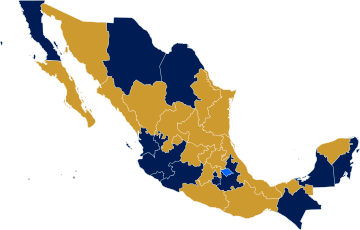Same-sex marriage in Oaxaca
Same-sex marriages are not routinely performed in the Mexican state of Oaxaca, although judges have issued marriage certificates in individual cases. Although four decisions of the Mexican Supreme Court have indicated that the law should not be interpreted as "defining marriage as a legal union between a man and a woman", five such decisions are necessary for establishing a precedent for same-sex marriage.[1][2]
The 2012 Oaxaca case was pivotal in opening the door to legal same-sex marriage in every state in Mexico, through the injunction (amparo) process. Using international decisions, whose verdicts serve as legal precedent in Mexican courts, like the protections in the American Convention on Human Rights Atala Riffo and Daughters v. Chile case,[3] the U.S. cases Loving v. Virginia and Brown v. Board of Education,[4] and Mexico's own anti-discrimination ordinances, the Court ruled on 5 December 2012 that: 1) Laws limiting marriage to one man and one woman, or for the purposes of perpetuating the species, violate federal law requiring that they "correspond to all persons without any distinction" and 2) That such laws are unconstitutional on the basis of discrimination by sexual orientation and usurpation of the right, not only of the individual but also the couple's right, to form a family.[5] Barring legislative will to change state laws, a provision in the Mexican Code allows that five rulings in a state with the same outcome on the same issue override a statute and establish the legal jurisprudence to overturn it.[6] Thus, marriages obtained by injunction could be performed in any state, regardless of whether the state Civil Code had been changed.[7]
History

2012 Supreme Court case
In August 2011, three same-sex couples, four women and two men, applied to be married and were denied by the Civil Registry in Oaxaca.[8] In January 2012, an injunction was sought, but was denied on 31 January. The couples appealed the judgment to the Collegiate Courts in Civil and Administrative Matters for the State.[8] On 9 April 2012, one of the lesbian couples was granted permission by a judge to marry in Oaxaca, thus becoming the first approval for same-sex marriage in the state. The case was appealed. On 5 December 2012, the three couples won their appeal from the Supreme Court,[8] but local officials refused to perform the marriages. The case returned to the Supreme Court and an additional ruling in favor of the couples was issued. The first lesbian couple received authorization to marry from the Civil Registry on 25 February 2013.[8] They were the first same-sex couple married in Oaxaca and celebrated their marriage on 22 March 2013.[8][9] The male couple received notice of their authorization on 3 June 2013,[8] and the third couple two days later.[10] It was announced in November 2014 that four same-sex couples had married in the state.[8]
On 26 August 2012, a Mexican federal court judge ordered the state of Oaxaca to perform same-sex marriages based on a recent constitutional amendment which bans discrimination based on sexual orientation. This ruling and two others were reviewed by the Mexican Supreme Court and the Court issued unanimous rulings on 5 December 2012, overturning the ban on same-sex marriage in three individual cases.[11][12] To establish precedent however, five individual cases must be decided this way.[1]
Amparos
On April 23, 2014, the Mexican Supreme Court set further precedent in the state. The case brought before the Court involved 39 same-sex couples who sought the right to marry.[13]
In July 2017, a same-sex couple was successful in getting married without receiving an injunction.[14]
The first same-sex marriage in Santiago Jamiltepec took place in April 2018.[15] Salina Cruz's first same-sex marriage was performed the following month.[16]
Oaxaca City
According to reports from late August 2018, the Civil Registry of Oaxaca City allows same-sex couples to marry without the need for an amparo. However, the process takes three business days, compared with two hours for opposite-sex couples.[17]
See also
References
- 1 2 "Mexican supreme court decision first step in possible path to national gay marriage". Washington Post. 7 December 2012. Retrieved 8 December 2012.
- ↑ Michael K. Lavers (6 December 2012). "Mexican Supreme Court rules for marriage equality". The Salon. Retrieved 9 December 2012.
- ↑ Mexican Supreme Court rules for marriage equality
- ↑ Mexican Supreme Court: American Cases Demand Marriage Equality
- ↑ (in Spanish) DECRETO NÚMERO 345 POR EL QUE SE APROBÓ EL CÓDIGO CIVIL PARA EL ESTADO DE OAXACA, ARTÍCULO 143. DETERMINAR LA INTERPRETACIÓN DE LOS ARTÍCULOS 1 Y 4 EN CONJUNCIÓN CON EL ARTÍCULO 121, 124 Y 133, CONSTITUCIONALES TODOS LOS ÁMBITOS DE PODER POLÍTICO ESTÁN OBLIGADOS NO SÓLO A NO DISCRIMINAR A LAS PERSONAS POR SU ORIENTACIÓN SEXUAL E IDENTIDAD DE GÉNERO, SINO A PROTEGER LA EXPRESIÓN DE SU IDENTIDAD LO QUE IMPLICAN PROTECCIONES LABORALES, EDUCATIVAS, DE SALUD, PROTEGER SUS RELACIONES FAMILIARES, PROHIBIR LA DISCRIMINACIÓN A NIÑOS LGBTI O MIEMBROS DE FAMILIAS DIVERSAS Y MUCHAS OTRAS MÁS.
- ↑ Mexican Supreme Court finds gay marriage ban unconstitutional
- ↑ (in Spanish) Legal el matrimonios de personas del mismo sexo
- 1 2 3 4 5 6 7 Matrimonio entre personas del mismo sexo. Caso Oaxaca
- ↑ "Oaxaca celebra su primera boda gay tras fallo de SCJN", Terra, 28 March 2013
- ↑ Suprema Corte avala segundo matrimonio gay en Oaxaca
- ↑ "Mexican judge orders state to perform homosexual 'marriages'". Lifesitenews.com. 2012-08-23. Retrieved 2014-04-05.
- ↑ "Mexico Supreme Court Rules In Favor Of Marriage Equality". ThinkProgress. 2012-12-05. Retrieved 2014-04-05.
- ↑ (in Spanish) "La SCJN declara inconstitucional prohibición del matrimonio gay en Oaxaca". CNN México. 2014-04-24. Retrieved 2014-04-26.
- ↑ Realizan en Oaxaca primera boda gay sin juicio de amparo
- ↑ (in Spanish) Celebran matrimonio gay en Santiago Jamiltepec, Oaxaca
- ↑ (in Spanish) Realizan primera boda legal entre mujeres en Salina Cruz
- ↑ (in Spanish) Van 6 matrimonios igualitarios en Oaxaca durante 2018
